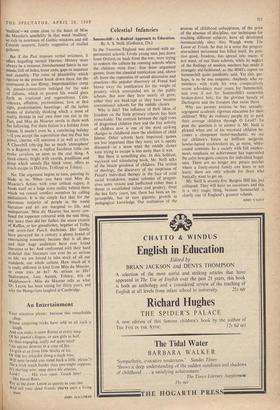Celestial Infancies
IN the Twenties England was covered with ex- perimental schools. Lively young men just down from Oxford, or back from the war, were trying to redeem the culture by running schools where the children were free: free from organised games, from the classical curriculum and, above all, from the repression of sexual discussion and practices—the popular discovery of Freud had blown away the justification for the weight of prudery which surrounded sex in the public schools. But now they have nearly all gone; either they are bankrupt or they have become conventional schools for the middle classes.
Why is this? The influence of their ideas of freedom on the State primary schools has been remarkable. The contrast between the rigid rows of dragooned children then and the free activity of children now is one of the most striking changes in childhood since the abolition of child labour. Other schools have improved; games are less important than they were; sex is openly discussed—in a sense what the middle classes were trying to escape is less nasty than it was. But there is something else. In this brilliant, wayward and stimulating book, Mr. Neill talks of the innate goodness of children. The revival of theology, the discovery of the emptiness of Freud's individual therapy in the face of total social breakdown, makes colonies of progres- sives seem remote and ineffectual rather than a threat to established values and prudery. Over the last forty years, too, there has been an im- perceptible, but hi sum gigantic, growth in pedagogical knowledge. Our realisation of the
sources of childhood unhappiness, of the price of the absence of discipline, our techniques for teaching different subjects, have all developed immeasurably since Alec Waugh wrote The Loom of Youth. So that in a sense the progres- sive-school movement has killed itself. Its posi- tive good, freedom, has spread into many, if not most, of our State schools, while its neglect of the findings of modern teachers has made it strangely old-fashioned, as the HMI's report on Summerhill quite justifiably said. Yet this, per- haps, is to be too sanguine. Anybody who re- members with truth his own comparatively recent schooldays must yearn for Summerhill, and even if not for Summerhill's somewhat broken-down huts, for the glorious beauty of Dartington and the freedom that exists there.
Why are parents anxious to buy sexually- segregated academic rigorous education for their children? Why do ordinary people try to push their average children through 0 Level? To pose, the question is to answer it. Mr. Neill is pleased when one of his wayward children be- comes a competent motor-mechanic; we see our children's future as brilliant surgeons, bowler-hatted stockbrokers or, at worst, white- coated scientists. In a society with full employ- ment, emphasis on achievement has superseded the calm bourgeois concern for individual happi- ness. There are no longer any potato patches where a freely-reared family can learn or not learn; there are only schools for those who basically want to get on.
Mr. Neill is seventy-five. Burgess Hill has just collapsed. They will have no successors and this is a very tragic thing, because Summerhill is clearly one of England's greatest schools.


































 Previous page
Previous page